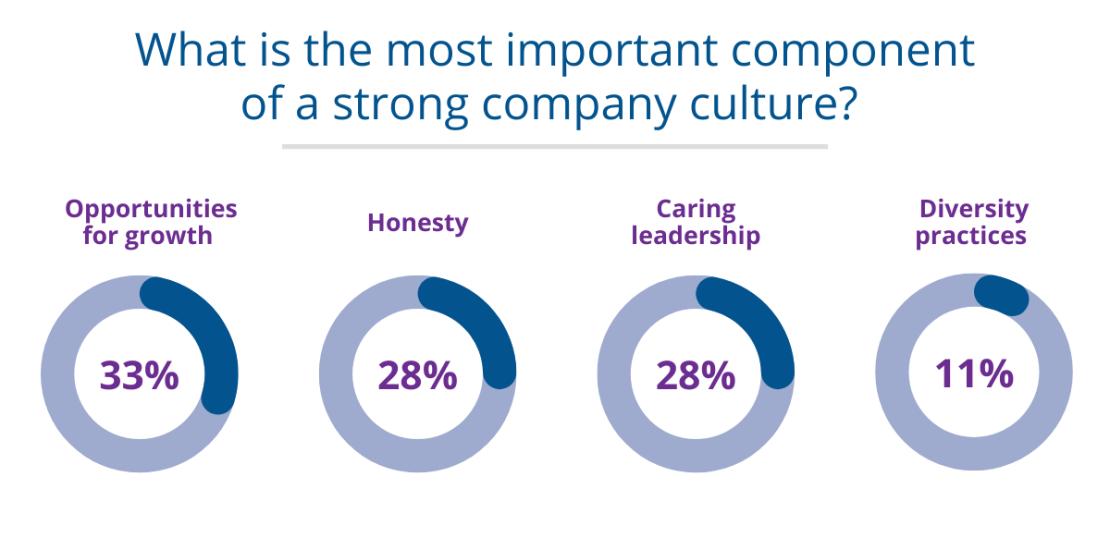What Makes a Strong Company Culture?
- August 29, 2022
- Posted by: Selen Warner
- Category: Blog

The past few years have shifted the workforce trends significantly. This year alone has been a one-of-a-kind year so far, beginning with the Great Resignation and an extremely hot job market and then progressing into uncertainty with layoffs and hiring freezes. Regardless of the trends and circumstances, companies always need the right people in the right roles to remain successful which makes hiring the right individuals and retaining top talent a top priority for each organization at all times. Although there are so many elements to attracting and retaining top talent, a strong company culture undoubtedly plays a key role.
Company culture is one of the most complex aspects of a business that consists of several variables to consider when trying to bring different people to work together in a way to promote an environment that has a positive impact on the workplace and business outcomes. And, those variables are key to attracting people who are a match to an organization’s culture. We wanted to understand what our professional network considers the most important component of a strong company culture and we polled our community for their insights.
What is the most important component of a strong company culture? (single answer)
- Diversity practices 11%
- Honesty 28%
- Caring leadership 28%
- Opportunities for growth 33%
According to our poll results, providing opportunities for growth is the most important aspect of a strong company culture. Gartner’s 2022 research states that people are motivated when they are acknowledged, feel trusted and provided with growth opportunities and that compensation is not the only driver behind motivation. When organizations integrate career growth opportunities and internal promotions into their practices, employees are empowered to envision their future potential successes, providing a win-win scenario for both the employees to remain motivated and engaged, and ultimately for the organization as a whole to be successful. Establishing a workplace where hard work and both little and big successes are appreciated and rewarded is essential because when people know they will succeed as the company succeeds, they will be more motivated and driven to help the team and organization be more successful.
When organizations allow employees to grow into leadership positions and reach their career goals, they will retain top talent easier than companies that do not provide growth opportunities. Additionally, candidates evaluate organizations during the hiring process, and most of them will want to work for an organization where they can grow and reach their career goals.
Following growth opportunities, caring leadership and honesty share the second row with both voted at 28%. Every aspect of company culture can be improved when the leadership team truly puts people first, demonstrating genuine care and compassion towards employees. Adopting a caring culture requires authentic “care” and has to go beyond speeches and written policies, and leaders really need to put care into their daily actions and focus on helping teams thrive. As leaders continuously model caring behavior, a caring culture will be established throughout the organization where every team member is committed to supporting and helping each other. In such an environment, the caring culture will be automatically embedded into HR and recruiting practices and candidates will feel welcome from the initial interactions with the employer. As employees feel a sense of belonging from the beginning of their relationship with the employer, cultural fit and alignment will happen easily and naturally, resulting in higher retention.
Honesty is one of the most effective ways to establish a company culture that will accelerate an organization’s long-term success. Honesty and integrity should be maintained within all relationships and communication between leaders, employees, partners and customers. Although it is very important that leaders show consistent behavior to demonstrate ethics, and model honest and open behavior, it is really about the entire team to adopt honesty, acknowledge mistakes, accept feedback and discuss opinions throughout the organization.
Lastly, 11% of survey respondents voted having diversity practices in place as the most important component of a strong company culture. Diversity in the workplace provides proven benefits to any organization. According to a study by McKinsey & Co., organizations that prioritize diversity are 35% more likely to have better financial returns than companies that don’t and according to another study by Deloitte, diversity and inclusion in the workplace can boost innovation by as much as 20%.
Diversity in the workplace should be more than meeting set goals and numbers. It should focus on creating a workforce that contains a valuable mix of backgrounds, experiences, ethnicities, physical abilities, genders, and other differences. Establishing a safe and supportive work environment that acknowledges and celebrates all aspects of diversity and enables employees to bring their best selves out will result in increased productivity, a happier workforce and reduced turnover rates.
There are many other components of a company culture we have not discussed in this article. Every company is unique and will have different priorities to establish a strong company culture. In order to make the biggest impact on company culture, it is essential for the leadership team to identify what matters the most to their company’s identity, mission and vision, and to focus on those important aspects to establish and maintain a strong company culture.

